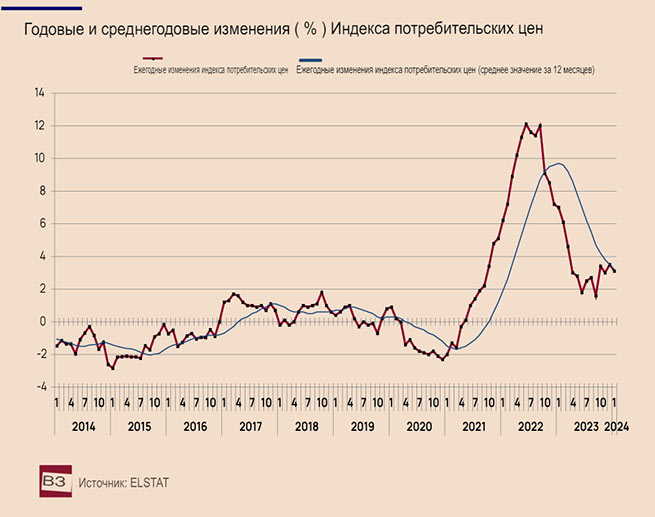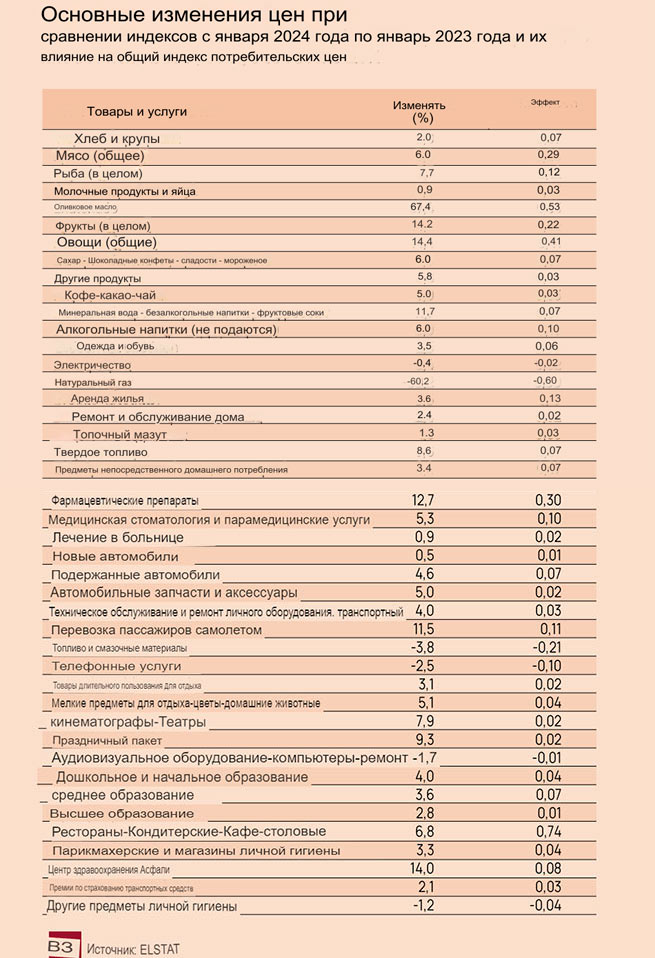Inflation in January was 3.1%, compared to 3.5% in December 2023, increasing concerns among citizens and the government about the new dynamics of rising prices.
Consumers in Greece are under further financial pressure as food prices remain high despite inflation slowing slightly from December estimates.
According to the data ELSTATthe overall CPI in January 2024 compared to December 2023 showed a decrease of 0.8% compared to the 0.5% decrease that occurred in the corresponding comparison of the previous year.
The average CPI for the twelve months of February 2023 – January 2024, compared with the corresponding CPI for the twelve months of February 2022 – January 2023, showed an increase of 3.2%, compared with an increase of 9.7% recorded in the corresponding comparison twelve months of February 2022 – January 2023 with twelve months of February 2021 – January 2022.

The slight slowdown in inflation is mainly due to lower energy prices, while food inflation remains high.
The key challenge remains the continued rise in prices of key commodities, which has a negative impact on consumers. The table shows that olive oil has risen in price by 67.4%, fruits and vegetables – by 14%, mineral water – by 11.7%. Health insurance premiums increased by 14%, air tickets by 11.5% and pharmaceutical products by 12.7%. On the other hand, natural gas prices are 60% lower than in January 2022.

Individual sectors
The 3.1% increase in the overall CPI in January 2024, compared to the January 2023 index, is mainly due to changes in the following groups of goods and services.
By increasing the indices by:
- 8.3% in the “Food and non-alcoholic drinks” group, mainly due to rising prices for bread and cereals, meat (general), fish (general), dairy products and eggs, olive oil, fruits (general), vegetables ( general), sugar-chocolate-sweets-ice cream, other food products, coffee-cocoa-tea, mineral water-soft drinks-fruit juices.
- 2.6% in the Alcoholic Beverages and Tobacco group, mainly due to rising prices for alcoholic beverages (without service).
- 3.5% in the “Clothing and footwear” group due to rising prices for clothing and footwear.
- 1.9% in the group “Durable Goods – Household Goods and Services”, mainly due to rising prices for household items for direct consumption.
- 5.7% in the Healthcare group, mainly due to rising prices for pharmaceuticals, medical, dental and paramedical services, and hospital care.
- 0.2% in the “Transport” group, mainly due to rising prices for new cars, used cars, spare parts and accessories for cars, maintenance and repair of personal transport, air passenger transport tickets. This growth was partially offset by lower prices, mainly for fuels and lubricants.
- 2.6% in the “Recreation and Entertainment” group, mainly due to rising prices for durable goods for recreation, small goods for recreation – pets, cinemas – theaters, vacation packages. This growth was partially offset by lower prices, mainly for audiovisual equipment – computers – repairs.
- 3.5% in the “Education” group, mainly due to rising prices for fees for pre-school and primary education, fees for secondary education, fees for higher education.
- 6.4% in the “Hotels-cafes-restaurants” group, mainly due to rising prices for cafeteria restaurants.
- 1.7% in the “Other goods and services” group, mainly due to rising prices in hairdressing salons and personal care salons, health insurance premiums, and auto insurance premiums. This growth was partially offset by lower prices, mainly for other personal care products.
Index reduction by:
- 2.7% in the Housing group, mainly due to lower prices for electricity and gas. This decrease was partially offset by rising prices, mainly for rental housing, repairs and maintenance of housing, heating oil, and solid fuel.
- 2.2% in the Communications group, mainly due to lower prices for telephone services.
At the same time, as Alpha Bank notes in its weekly bulletin on the Greek economy, in 2020, due to the pandemic and measures to limit economic activity, a decrease in gross disposable income was recorded, which exceeded the corresponding decrease in the harmonized consumer price index (-5. 1% versus -1.3%).
Subsequently, in 2021, disposable income recovered at a significantly higher rate than the CPI (7.6% vs. 0.6%), largely due to the base effect as economic activity gradually began to normalize.
Comparing January 2024 with December 2023
The decline in headline CPI by 0.8% in January 2024, compared with the corresponding figure in December 2023, was mainly due to changes in the following groups of goods and services:
1. From an increase in indicators by:
- 0.5% in the “Food and non-alcoholic drinks” group, mainly due to rising prices for sausages, fresh fish, yogurt, olive oil, fresh vegetables, canned or processed vegetables. This increase was partially offset by lower prices, mainly for pasta, poultry, whole fresh milk, reduced fat fresh milk, cheese, and fresh fruit.
- 1.7% in the “Alcoholic Beverages and Tobacco” group, mainly due to rising prices for alcoholic beverages (not served).
- 0.3% in the Healthcare group, mainly due to rising prices for pharmaceutical products.
- 0.1% in the Transport group, mainly due to rising prices for passenger air tickets. This growth was partially offset by lower prices for motor fuel (gasoline).
- 0.8% in the Communications group, mainly due to rising prices for mobile communication services.
- 1.1% in the “Hotels-cafes-restaurants” group, mainly due to rising prices for restaurants-cafes-cafeterias. This growth was partially offset by lower prices, mainly for hotels-motels-restaurants.
- 1.0% in the “Other goods and services” group, mainly due to an increase in health insurance premiums.
2. From a decrease in indicators by:
- 22.3% in the “Clothing and footwear” group, due to general winter sales.
- 0.3% in the Housing group, mainly due to lower prices for utility taxes, gas, and heating oil. This decline was partially offset by rising electricity prices.
- 0.5% in the “Durable Goods – Household Goods and Services” group, mainly due to lower prices for home textiles.







More Stories
Greece is at the bottom of the EU in information and communication technologies
Real wages in Greece fell by 30%
ELSTAT: inflation increased by another 3.2% in March